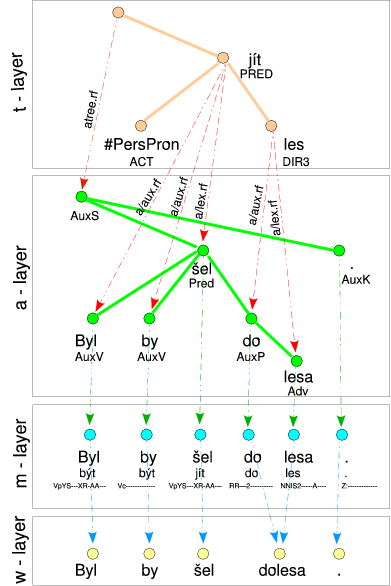Deep Syntax: Difference between revisions
No edit summary |
No edit summary |
||
| Line 12: | Line 12: | ||
[[File:i-layer-links.png|300px]] | [[File:i-layer-links.png|300px]] | ||
The lowest layer contains the sentence "as is", without any annotation. The m-layer provides a morphological analysis for each word (and also fixes typing errors). The a-layer is a dependency tree which describes the surface syntax of the sentence. Finally, the t-layer is a more abstract dependency tree which describes the deep syntax of the sentence. | |||
== Prague Dependency Treebank == | == Prague Dependency Treebank == | ||
Revision as of 12:47, 7 October 2015
 | |
| Lecture video: |
web TODO Youtube |
|---|---|
Functional Generative Description
The functional generative description (FGD) is a linguistic theory developed by Petr Sgall in Prague in the 1960's. It formally describes the language as a system of layers, ranging from the most basic layers (phonology) to abstract ones (deep syntax/semantic -- the tectogrammatical layer). The theory was developed with the intention to capture the language using a computer and indeed, much of the theory has been implemented as computer programs. However, the system of layers was gradually simplified and currently, only four layers are used (we refer to the annotation scheme for the Prague Dependency Treebank). An example of the layered description is shown on the following image (taken from PDT-2.0 documentation):
The lowest layer contains the sentence "as is", without any annotation. The m-layer provides a morphological analysis for each word (and also fixes typing errors). The a-layer is a dependency tree which describes the surface syntax of the sentence. Finally, the t-layer is a more abstract dependency tree which describes the deep syntax of the sentence.
